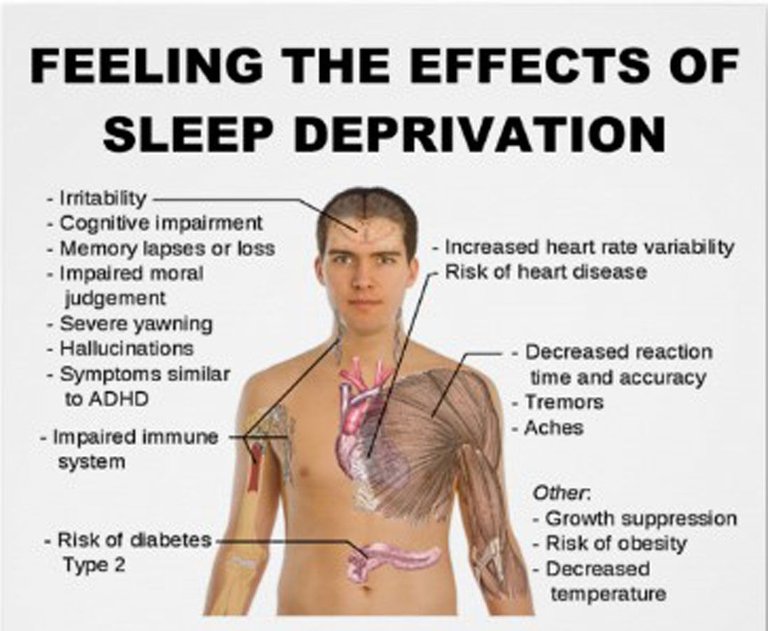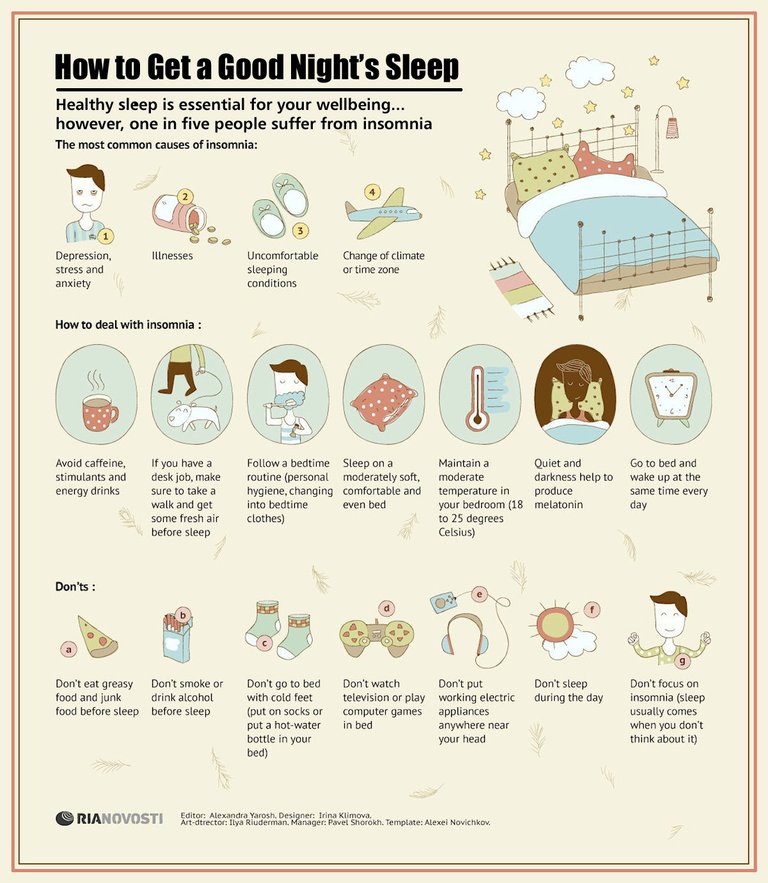
Sleep is the golden chain that ties HEALTH and our bodies together.
"Thomas Dekker"
A long way from being a period squandering, 8-hour sentence in a futile void, the exploration is entirely clear on this point: rest is vital for good wellbeing. It helps memory and temperament, keeps you trim, fortifies your resistant framework, battles irritation, and keeps your heart and veins fit as a fiddle.
Shelby Freedman Harris, PsyD, director of behavioral sleep medicine at Montefiore Medical Centers Sleep-Wake Disorders Center in New York City says "When you're sleeping you're regulating hormone levels, you're regulating insulin levels, your blood pressure is being kept under control, there are a lot of things going on, and if you're not getting enough sleep you're throwing these things out of whack"
While you're snoozing, the body repairs damaged tissue, produces crucial hormones, and strengthens memoriesa process called consolidation, which helps you perform a new skill better after sleeping than you would if you spent an equivalent amount of time awake. (Take that, all-nighters!)
Virend K. Somers, MD, a professor of medicine and cardiovascular diseases at the Mayo Clinic in Rochester, Minn., who studies sleep and heart health says "It's a way for the body to integrate everything that happened over the past waking day and to kind of prepare for the next day"

Why your heart needs a good night's sleep?
Short sleepers, normally characterized as individuals who get under six hours of rest a night, and additionally individuals who don't invest enough energy in the most profound phases of rest, are at higher danger of heart assaults and strokes than the individuals who get no less than seven hours.
A recent report in male Japanese assembly line laborers found the individuals who rested under six hours a night had a five-overlay expanded heart assault hazard over a 14-year traverse contrasted and the individuals who logged in the vicinity of 7 and 8 hours every night. Another distributed in 2011 found that solid men 65 and more established with ordinary circulatory strain were about twice as prone to create hypertension amid the investigation on the off chance that they invested less energy in the most profound rest organize (known as moderate wave rest) contrasted and the individuals who invested the most time profoundly sleeping.
"Somebody's stifling you, so your heart rate goes up, your circulatory strain goes up, and as opposed to having a day by day cycle in which everything backs off around evening time, rather everything is higher amid the night," says Charles Czeisler, MD, the Baldino Professor of Sleep Medicine at Harvard Medical School in Boston. "After some time, even your daytime circulatory strain is higher." truth be told, he includes, numerous specialists think rest
apnea may represent 33% of all instances of hypertension among grown-ups.

Is lack of sleep making you fat?
Late research additionally recommends that an absence of rest could be adding to issues like diabetes and weight increase, both genuine wellbeing risks. A few investigations have connected shorter rest to a more prominent probability of heftiness, however regardless of whether dozing less is a reason or impact of corpulence stays indistinct.
What we do know is that lack of sleep decreases affectability to insulin, the key glucose directing hormone, while making it harder utilize glucose appropriately. Short rest additionally supports levels of hormones that make us hungry, while decreasing discharge of the hormones that assistance us feel full. So it bodes well that being famished for rest could prompt weight gaineven if just for the way that being conscious longer gives us more opportunity to eat.
"You don't have to be overweight to have sleep apnea, but if you are, sometimes losing at least 10% of your body weight can reduce the severity of your sleep apnea," Harris says.

How to get a better night's sleep?
Let's assume you climb into bed, arranged for a sound seven or eight hours and after that gaze at the clock for four of them. Is altogether lost? On the off chance that you experience difficulty dozing for a couple of days all over, finding a way to enhance your rest ought to get you back on track. What's more, you can be guaranteed that you have a lot of organization. As per the National Sleep Foundations 2011 Sleep in America Poll, 60% of US grown-ups say they have rest issues each night, or relatively consistently.
The first step for anyone with sleep problems should be to take a careful look at your sleep hygiene, Harris says.
This means organizing your surroundings and activities to promote sleep as bedtime approaches. Skip caffeine after noon, she advises (and dont forget that diet soda, herbal teas, and chocolate can contain caffeine too). Avoid alcohol or heavy meals within three hours of bedtime.
"Exercise is awesome for rest, particularly nodding off," Harris includes. You'll get the most advantage by working out five to six hours for sleep time. A hot shower or shower around 90 minutes before sleep time can likewise be useful.
Finally, don't make your Facebook page, BlackBerry, or TV your final destination of the evening. Using these devices for communication is clearly eating into our sleep time, Dr. Somers says. “People are spending more time being connected than sleeping." Texting friends, playing computer games, or just watching TV stimulates our brains and bodies at a time when we should be winding down, and the extra light we expose ourselves to when we peer at a screen could be throwing off our body clocks.
This is because when it gets dark, our bodies release a hormone called melatonin that helps make us sleepy, and pre-bedtime bright light exposureespecially exposure to the blue light emitted by screens large and smallweakens melatonin release.
At last, don't make your Facebook page, BlackBerry, or TV your last goal of the night. Utilizing these gadgets for correspondence is plainly eating into our rest time, Dr. Somers says. "Individuals are investing more energy being associated than dozing." Texting companions, playing PC recreations, or simply sitting in front of the TV invigorates our brains and bodies when we ought to slow down, and the additional light we open ourselves to when we peer at a screen could be diverting from our body tickers.
This is on account of when it gets dull, our bodies discharge a hormone called melatonin that helps make us drowsy, and pre-sleep time splendid light exposureespecially presentation to the blue light produced by screens extensive and smallweakens melatonin discharge.
"I have a great deal of patients say, I'm simply viewing YouTube recordings on my iPhone during the evening," Harris says. "It may quiet, however it's really accomplishing comment melatonin in your cerebrum. I generally advise individuals to cut off screen time a hour prior going to bed."
Individuals with long-standing, incessant a sleeping disorder require more than a rest cleanliness tune up, Harris says. A couple of sessions of psychological behavioral treatment (CBT), a sort of advising intended to enable individuals to change the way they consider testing situationslike insomniaand react all the more decidedly to them, can be useful, as per Harris. Four to eight sessions are typically enough.
"In the rest field we really prescribe that patients do that to start with, in light of the fact that it's here and now and it's superior to getting snared on a pill," she includes. Be that as it may, if CBT doesn't help, solutions might be essential. "They have a place unquestionably," says Dr. Somers, "however they should be utilized painstakingly and insightfully."
However, imagine a scenario where you appear to flourish with six hours of rest a night. "Doubtlessly that there's a scope of rest needs, similar to there's a scope of each physical capacity, however precisely what the ordinary limits of that range are I don't have the foggiest idea, and I don't figure anybody can state for certain," Dr. Somers says.
"The most ideal approach to make sure that you're dozing enough," he includes, "is to wake up unexpectedly without the utilization of a wake up timer and to feel rested when you wake up. In the event that those things happen and you're not feeling lethargic amid the day, at that point you're most likely resting enough."